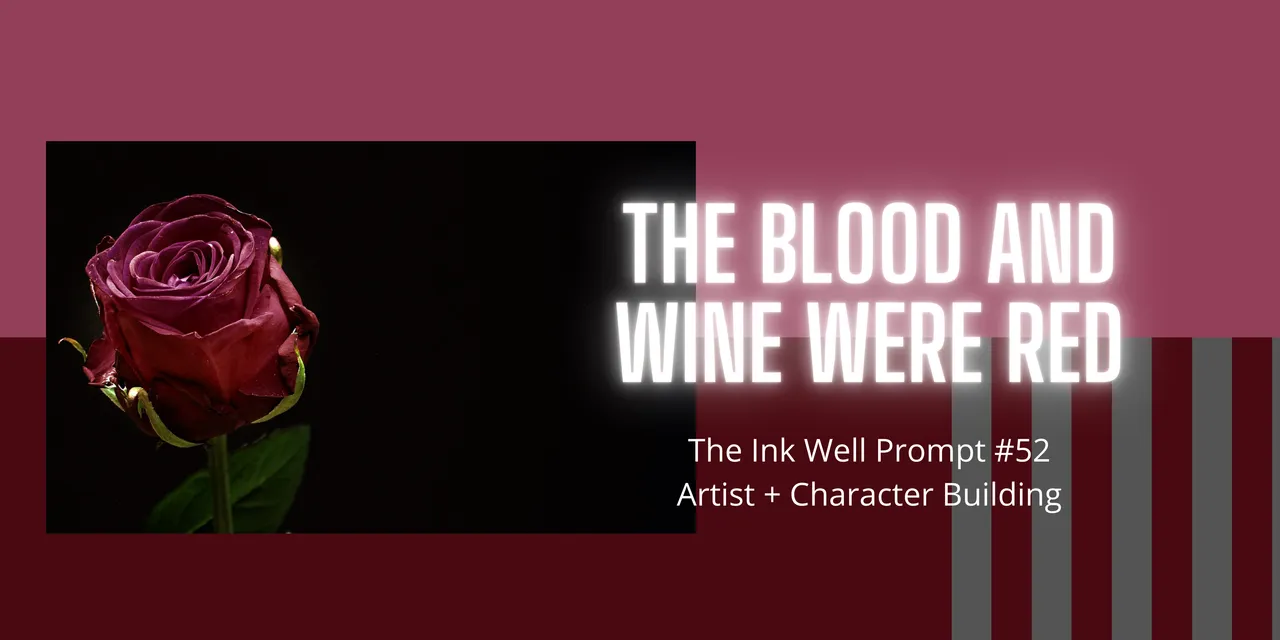Thanks to @theinkwell for this week’s prompt. The weekly challenge page can be found here.
This was a tough week, and I confess, was the longest I’ve taken to put together a piece for these prompts. I guess part of the challenge was doing justice to the character emerging from the prompt - perhaps I felt the weight of an artist, tortured by needing to get it just right. I enjoyed the challenge of building a character; opting for an unnamed young woman with a somewhat universal quality. She could be anyone, yet is defined by her experience in art. This week, I'm playing with colour symbolism, you might notice a red motif running through, pairing with a growing darkness.
For those with a keen literary eye, you might have already been delighted by the allusion in the title to Oscar Wilde - one of the greatest literary artists I know.

Cover manipulated in Canva, using linked image
Weekly Prompt: Artist
Skill building: Character Description
**The wine and blood were red. **
Spotting the floor, caressing the carpet; neither stain would likely ever come out, nor the flecks it left on her heart. She had cut her hand as she smashed the long-stemmed glass, an heirloom gifted from her grandmother. She looked at the pieces, small, but beautiful – and much like herself, shattered.
She had put her everything, her absolute being, her soul, her life – utterly everything into her self-portrait, and it had been destroyed by another’s malice. She had not won the local art prize, instead, nepotism had won. The venality of it all had left her seething.
As she stood, losing track of time, she would unconsciously pull back a rogue mousey brown hair from her porcelain face. Her lips were not as red as her anger, and she was not known for her deep eyes, nor her freckles. She was not distinct in any particularly way, yet she could capture the world in a stroke of a brush – taking the lines of the horizon and painting the oceans into a new existence.
On receiving the phone call, she had slumped her small shoulders. ‘Oh, but it will be better for our small art society’s profile’. ‘And yes, she is the Chairman’s daughter’. ‘No, don’t get me wrong, your work was technically better, but you know--‘. She had cut off the spiel; she had heard it before, but this time it was different, this time was not about another’s vanity, but rather, her masterpiece and its demand for an audience.
Regaining her composure, and steadying her breathing, she realised the night had fallen dark, and she went to bed.
For a short while, she tossed from one side to the other, agitated, yet on the dawn of inspiration. The night was not warm, but she felt unsettled. She rose shortly after eleven, a little weary on her feet, perhaps grateful that most of the bottle had been left on the floor, rather than consumed. She seemed to be drawn to her studio, and her pale hands traced the walls along the corridor until they found the doorknob. She moved her tongue over her left incisor, and understood that she was about to lose herself to her art.
Tentatively, she moved things around her desk, the clutter more about her lack of organisational care, than a deliberate attempt to portray an artist’s aloofness. Finding her charcoals and a discarded canvas long ago painted in shades of crimson, she took her seat. She sketched a deliberate outline of the trees she couldn’t see, but knew were outside her window. Beneath them, she placed a young woman. An occasional tear dropped to the canvas, quickly mixing through the blacks.
As she worked her look became more intensely jaded, and at times, she heaved her small breast – her breathing punctuating an otherwise silent night. She had never worn pyjamas, opting for an old singlet top instead. As the night wore thin and the morning began to emerge, the pale green top had become increasingly soiled with the charcoals. The gloom of her mood sat poignantly in the room, not yet dispersed by an exclamation of creative fervour as the world of her art became more powerfully real.
Hours later, she stopped. She placed the canvas by the window, studying the intricate lines and the dark gradients consuming the space. In this moment, it was a gateway to her entire world, both heavy and black. A vista, she felt, may never be unburdened.
